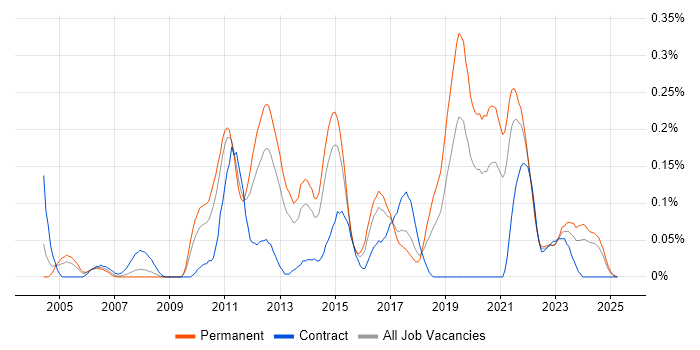Legacy Code
England > West Midlands
The table below looks at the prevalence of the term Legacy Code in permanent job vacancies in the West Midlands. Included is a benchmarking guide to the salaries offered in vacancies that cited Legacy Code over the 6 months leading up to 16 September 2025, comparing them to the same period in the previous two years.
| 6 months to 16 Sep 2025 |
Same period 2024 | Same period 2023 | |
|---|---|---|---|
| Rank | 167 | 217 | 196 |
| Rank change year-on-year | +50 | -21 | +111 |
| Permanent jobs citing Legacy Code | 2 | 7 | 4 |
| As % of all permanent jobs advertised in the West Midlands | 0.061% | 0.12% | 0.10% |
| As % of the Miscellaneous category | 0.15% | 0.40% | 0.26% |
| Number of salaries quoted | 1 | 1 | 3 |
| 10th Percentile | - | - | - |
| 25th Percentile | - | £51,250 | - |
| Median annual salary (50th Percentile) | £70,000 | £52,500 | £55,000 |
| Median % change year-on-year | +33.33% | -4.55% | +2.80% |
| 75th Percentile | - | £53,750 | £60,000 |
| 90th Percentile | - | - | £63,000 |
| England median annual salary | £90,000 | £90,000 | £57,500 |
| % change year-on-year | - | +56.52% | -14.81% |
All Generic Skills
West Midlands
Legacy Code falls under the General and Transferable Skills category. For comparison with the information above, the following table provides summary statistics for all permanent job vacancies requiring generic IT skills in the West Midlands.
| Permanent vacancies with a requirement for generic IT skills | 1,316 | 1,763 | 1,544 |
| As % of all permanent jobs advertised in the West Midlands | 40.36% | 29.27% | 39.04% |
| Number of salaries quoted | 767 | 777 | 1,037 |
| 10th Percentile | £26,750 | £31,000 | £30,000 |
| 25th Percentile | £34,500 | £40,000 | £40,000 |
| Median annual salary (50th Percentile) | £45,147 | £55,000 | £55,000 |
| Median % change year-on-year | -17.91% | - | +14.82% |
| 75th Percentile | £63,125 | £65,000 | £68,750 |
| 90th Percentile | £75,000 | £75,000 | £81,250 |
| England median annual salary | £55,000 | £60,000 | £65,000 |
| % change year-on-year | -8.33% | -7.69% | +4.00% |
Legacy Code
Job Vacancy Trend in the West Midlands
Job postings citing Legacy Code as a proportion of all IT jobs advertised in the West Midlands.

Legacy Code
Salary Trend in the West Midlands
Salary distribution trend for jobs in the West Midlands citing Legacy Code.

Legacy Code
Job Locations in the West Midlands
The table below looks at the demand and provides a guide to the median salaries quoted in IT jobs citing Legacy Code within the West Midlands region over the 6 months to 16 September 2025. The 'Rank Change' column provides an indication of the change in demand within each location based on the same 6 month period last year.
| Location | Rank Change on Same Period Last Year |
Matching Permanent IT Job Ads |
Median Salary Past 6 Months |
Median Salary % Change on Same Period Last Year |
Live Jobs |
|---|---|---|---|---|---|
| Birmingham | +34 | 1 | £70,000 | +33.33% | 1 |
| Legacy Code England |
|||||
Legacy Code
Co-occurring Skills and Capabilities in the West Midlands by Category
The follow tables expand on the table above by listing co-occurrences grouped by category. The same employment type, locality and period is covered with up to 20 co-occurrences shown in each of the following categories:
